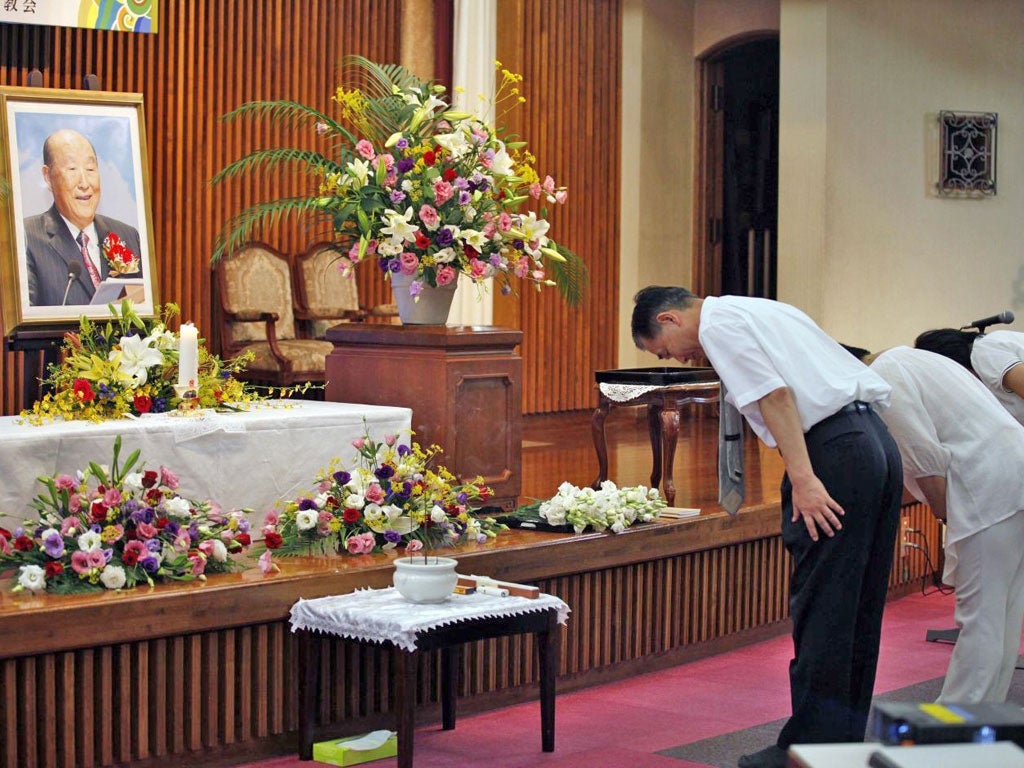Rest in peace, Reverend Moon. So what now for the Moonies?
As the Unification Church mourns its founder, a messy family succession threatens to split the controversial religion in two

On the first floor of a whitewashed Georgian mansion house close to Hyde Park there is a room with thick brown curtains, two empty chairs and a large signed portrait in a golden frame of an smiling elderly Korean couple. The chairs represent Reverend Sun Myung Moon and his wife Hak Ja Han.
For this is the headquarters of the British wing of the Unification Church – known to many by its unofficial nickname "the Moonies". Yesterday the house was eerily quiet as followers came to terms with the fact that their founder – a man who described himself as the second coming of Jesus Christ – had passed away in Korea after complications from pneumonia at the age of 92.
In a café on the bottom floor, students had left out a number of books showing photographs of the Reverend Moon throughout his colourful and controversial career. Later that evening they were planning to hold a prayer vigil in front of the two chairs that used to stand in for their leaders – known to their followers as the "True Parents" – when they were away.
Over the next two weeks many of Britain's estimated 1,200 Moonies will travel to Korea to see their leader's body lie in state in a palatial mansion that bears remarkable similarities to the White House. A funeral will then be held on 15 September in a stadium which can carry up to 30,000 people.
The Korean-born evangelist, who claimed Jesus came to him as a 15-year-old and told him to build a new theocracy on earth, leaves a vast business empire, a religious movement shrouded in controversy and a family of children at odds with each other. At the height of its power in the 1970s the church boasted hundreds of thousands of followers in Korea, Japan, North America and Europe whilst the fiercely anti-Communist Moon was a darling of sections of the American right. But with popularity came scrutiny and the church was repeatedly dogged by allegations from former members that young recruits were brainwashed and encouraged to part with vast sums of money. Their mass-marriage ceremonies were heavily criticised whilst the Reverend Moon found himself in an American prison cell after he was convicted of tax fraud.
In more recent years the Church bowed out of the limelight. Reverend Moon reinvented himself as a self-appointed "international man of peace" setting up an array of think tanks and charitable foundations. And his business empire continued to grow.
For the new generation of Unification Church leaders there is a determination to leave the movement's troubled past behind. Simon Cooper, a British-born convert who is the pastor at the London headquarters in Lancaster Gate, spent much of the day yesterday fielding calls from media organisations and shuttling between televisions studios.
"We need to engage with people and the media, show they that we're a different organisation to what they think," he said. "Korean culture is very family-based," he admits. "You see it in all the big tech companies. We don't have all the due processes you'd find, say in the Church of England. But that would be great as you'd have an objective type of process everyone can get behind. I think that has started to come in now to our movement."
Cooper himself came to the church as a student at Newcastle University. He went to see a talk by a Moonie and was converted. "It was something I wouldn't regard as a merely human emotion," he explains. "I took on this faith and it just developed."
As was traditional at the time in the Unification Church at the time, he allowed the Reverend Moon to choose him a wife – a Japanese convert living in Italy – simply by looking at pictures. "I had a gut instinct it would work and it did," he said.
Although the mass-marriage ceremonies are still very much part of the Moonie tradition, the practice of Reverend Moon pairing people up via pictures changed. Individual churches now encourage potential partners to meet through a "Heavenly Courtship" department. Couples see each other for 40 days and then decide whether they want to head down the path towards a marriage. It's an example of how the church is trying to make itself more transparent.
Much of the reformists' hopes are being placed in Reverend Moon's anointed successor, Hyung-Jin Moon. The 33-year-old Harvard-educated theologian is the founder's youngest son and, unlike many of his siblings, showed flare in the spiritual – rather than the profit-driven – side of the family business.
But he faces an internal challenge from an older brother – the somewhat confusingly named Hyun-Jin Moon. Known to his followers as "Preston Moon", he is primarily based in America and heads a sizeable chunk of the church's US assets including the company that owns the UPI news agency and the Washington Times. In recent years he fell out with his parents and runs a church within a church.
"The rest of the movement, the main body, will also carry on and the hope is that they will bury their differences," said Mr Cooper.
Like so many religious movements before it, therefore, the Moonies could split following the death of their founder. Only time will tell if the Unification Church can really stay unified.

Join our commenting forum
Join thought-provoking conversations, follow other Independent readers and see their replies